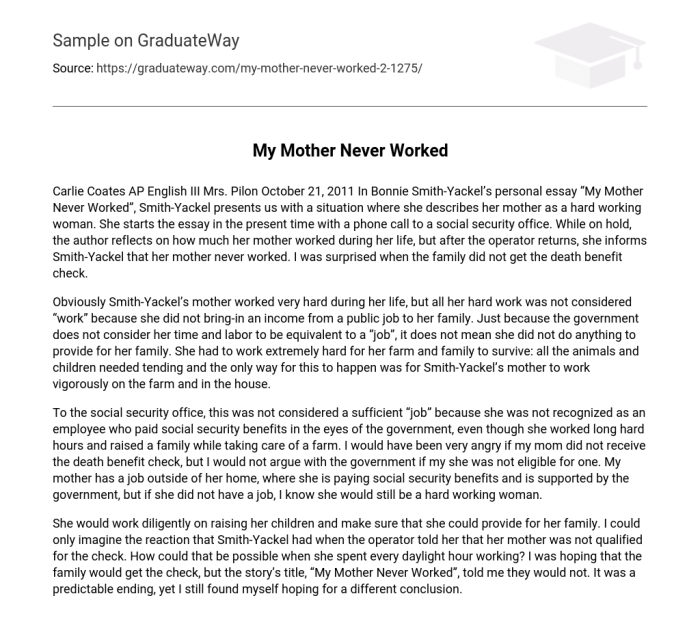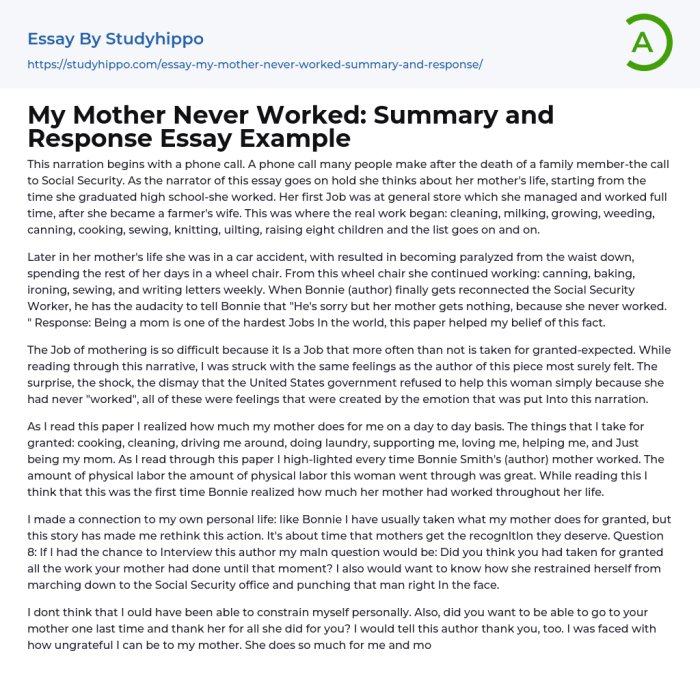My mother never worked by bonnie smith-yackel – Bonnie Smith-Yackel’s “My Mother Never Worked” presents a groundbreaking examination of the evolving roles of mothers throughout history and the profound impact they have on society, families, and children.
This comprehensive work delves into the economic, social, and emotional implications of mothers choosing to stay at home or pursue employment outside the home, providing a nuanced and thought-provoking analysis.
The Role of Mothers in Society
Throughout history, mothers have played a vital role in shaping families, communities, and societies. Traditionally, mothers have been responsible for nurturing and caring for their children, managing the household, and providing emotional support to their families. However, the role of mothers has evolved over time, influenced by social, cultural, and economic factors.
In many societies, mothers are increasingly pursuing education and careers outside the home. This shift has been driven by factors such as increased access to education, changing societal norms, and the need for financial independence. As a result, mothers today have a wider range of roles and responsibilities than ever before.
Despite the changing roles of mothers, they continue to make significant contributions to society. Mothers are educators, caregivers, advocates, and leaders. They play a crucial role in shaping the values and beliefs of their children and in fostering healthy and supportive communities.
Impact of Social, Cultural, and Economic Factors on Mothers’ Roles
The roles of mothers are shaped by a complex interplay of social, cultural, and economic factors. In societies that value traditional gender roles, mothers are expected to prioritize their domestic responsibilities over their careers. In contrast, in societies that promote gender equality, mothers are more likely to pursue education and employment outside the home.
Cultural norms also influence the roles of mothers. In some cultures, mothers are highly respected and revered, while in others they may face discrimination and limited opportunities. Economic factors, such as the cost of childcare and the availability of flexible work arrangements, can also impact mothers’ ability to balance work and family responsibilities.
Economic Impact of Mothers Not Working

The decision of whether or not to work outside the home is a complex one for many mothers. There are both financial and emotional factors to consider. Financially, mothers who do not work outside the home may experience a loss of income, which can have a significant impact on their families’ financial well-being.
Stay-at-home mothers also contribute to the economy in indirect ways. They provide unpaid caregiving for their children and other family members, which frees up others to participate in the workforce. Additionally, stay-at-home mothers often volunteer their time to community organizations, which provides valuable services to society.
Potential Benefits and Drawbacks of Mothers Working Outside the Home
There are both potential benefits and drawbacks to mothers working outside the home. On the one hand, working outside the home can provide mothers with financial independence, a sense of accomplishment, and opportunities for personal growth. On the other hand, working outside the home can also lead to stress, work-family conflict, and reduced time with children.
The decision of whether or not to work outside the home is a personal one that each mother must make based on her own circumstances and priorities. There is no right or wrong answer, and the best decision for one mother may not be the best decision for another.
Social and Emotional Impact on Mothers

Mothers who do not work outside the home may face a number of social and emotional challenges. They may experience feelings of isolation, lack of fulfillment, and depression. They may also be more likely to experience financial stress and relationship problems.
Potential for Isolation, Lack of Fulfillment, and Mental Health Issues
Stay-at-home mothers may feel isolated from the outside world, especially if they do not have other adults to interact with on a regular basis. They may also feel a lack of fulfillment if they do not have the opportunity to use their skills and talents outside the home.
In addition, stay-at-home mothers may be at an increased risk for mental health issues, such as depression and anxiety. This is due to a number of factors, including the stress of caring for children, the lack of social support, and the financial strain that many stay-at-home mothers experience.
Ways Mothers Have Found to Cope with Challenges
Despite the challenges they face, many stay-at-home mothers find ways to cope and thrive. They may find support from other mothers through playgroups, support groups, or online forums. They may also find ways to pursue their own interests and hobbies, such as volunteering, taking classes, or starting a home-based business.
Impact on Children

The decision of whether or not to work outside the home can have a significant impact on children. Children of stay-at-home mothers may have more time with their mothers and may develop stronger bonds with them. They may also be more likely to receive home-cooked meals and participate in extracurricular activities.
Potential Benefits and Risks of Children Having Stay-at-Home Mothers
There are both potential benefits and risks to children having stay-at-home mothers. On the one hand, children of stay-at-home mothers may have higher self-esteem and better social skills. They may also be less likely to experience behavioral problems.
On the other hand, children of stay-at-home mothers may be more likely to be overprotected and may have difficulty becoming independent. They may also be less likely to develop the skills and experience that are necessary for success in school and the workforce.
Research-Based Evidence on the Effects of Maternal Employment on Child Outcomes
Research has shown that the effects of maternal employment on child outcomes are complex and depend on a number of factors, such as the age of the child, the quality of childcare, and the mother’s work schedule. In general, research has found that children of mothers who work outside the home do not experience any significant negative effects in terms of their cognitive development, social development, or emotional well-being.
Balancing Work and Family

Mothers who choose to work outside the home face the challenge of balancing their work and family responsibilities. This can be a difficult task, but it is possible to find ways to make it work.
Challenges and Opportunities of Mothers Who Choose to Balance Work and Family
One of the biggest challenges that mothers who work outside the home face is finding affordable and reliable childcare. They may also struggle to find flexible work arrangements that allow them to spend time with their children.
However, there are also a number of opportunities for mothers who work outside the home. They may find that they are able to provide a better financial future for their families. They may also find that they are able to pursue their own interests and hobbies.
Successful Strategies for Balancing Work and Family
There are a number of strategies that mothers can use to balance work and family. These strategies include:
- Finding flexible work arrangements
- Creating a supportive network of family and friends
- Learning to delegate and ask for help
- Setting priorities and making time for what is important
Impact of Work-Family Policies on Mothers’ Ability to Succeed in Both Areas, My mother never worked by bonnie smith-yackel
Work-family policies can play a significant role in helping mothers to balance work and family. These policies can include paid parental leave, flexible work arrangements, and access to affordable childcare.
Research has shown that work-family policies can improve mothers’ job satisfaction, reduce work-family conflict, and increase their overall well-being. They can also help to improve the health and development of children.
FAQ Guide: My Mother Never Worked By Bonnie Smith-yackel
What is the central argument of “My Mother Never Worked”?
The book argues that the traditional role of mothers as unpaid caregivers is changing, and that this has significant implications for families, the economy, and society as a whole.
What are some of the challenges faced by stay-at-home mothers?
Stay-at-home mothers may face challenges such as social isolation, lack of fulfillment, and mental health issues.
What are some of the benefits of mothers working outside the home?
Mothers who work outside the home may experience increased financial independence, career advancement, and personal fulfillment.